Parents’ attitude toward assisted oral hygiene care for their children

*Corresponding author: Simy Mathew, Department of Growth and Development, Ajman University, College of Dentistry, Ajman, United Arab Emirates. s.mathew@ajman.ac.ae
-
Received: ,
Accepted: ,
How to cite this article: Poornima U, Luke AM, Mathew S. Parents’ attitude toward assisted oral hygiene care for their children. J Global Oral Health 2022;5:69-74.
Abstract
Objectives:
This study was conducted to understand the attitudes of parents toward oral hygiene care for children.
Materials and Methods:
A cross-sectional study was carried out to assess the parent’s reasons for brushing or not brushing their child’s teeth. Convenience sampling method was followed and 100 parents filled the 12-item self-administered questionnaire.
Results:
About 76% of the household mothers were brushing the children’s teeth. Around 41 children did not like to brush their teeth due to unpleasant taste/flavor of toothpaste. In our study, majority of the parents (73%) agreed that it is easier when both of them were present at home while their child is brushing.
Conclusion:
The present study revealed that the awareness and importance of good oral hygiene is less among the parents and the attitude of the parents toward their child’s oral hygiene is positive among mother when compared to father.
Keywords
Brushing
Oral hygiene
Dental caries
INTRODUCTION
Oral health is an important aspect of overall health.[1] Poor oral health may negatively affect a person’s quality of life including eating and sleeping.[2] Despite great improvements in oral health in recent decades, dental caries continues to be a significant source of morbidity for young children.[3] Dental caries in primary teeth is associated with dental caries in permanent teeth, thus primary prevention and early treatment of caries can have long-term benefits.[4]
Dental decay can be prevented through a combination of professional dental services and home oral hygiene.[5,6] Home oral hygiene, specifically regular tooth brushing with fluoridated toothpaste, is associated with lower caries and periodontal diseases,[7,8] and twice daily tooth brushing is significantly more effective than brushing once a day.[9] Twice daily tooth brushing is recommended by the American Dental Association, the American Academy of Pediatric Dentists, and the American Academy of Pediatrics,[10-12] however, parents of typically developed children report that twice daily tooth brushing is challenging to achieve. Frequent barriers to tooth brushing include parent’s oral health beliefs,[13,14] social norms, and external constraints such as time pressures and uncooperative child behaviors.[14]
There has been relatively little research exploring the influence of parent’s psychosocial attributes on their children’s oral health behavior.[15] A handful of cross-sectional studies has found children’s oral health behavior to be related to parental oral health knowledge,[16] attitude toward oral health,[17] and beliefs about oral health.[18] Hence, the current study has been planned with the aim to gain an in-depth understanding of the issues parents facing in brushing their child’s teeth at home.
MATERIALS AND METHODS
A cross-sectional study was carried out to assess the parents’ attitude toward assisted oral hygiene care for their children in Madurai district, Tamil Nadu. A convenience sampling methodology was used to select the sample. A sample of 100 parents and their children was selected. The study purpose and procedures were explained to the parents and their children and prior permission was taken.
A self-designed printed questionnaire form was used to collect the data. The questionnaire included data related to demographic information of the parents and their children such as age, sex, and education. Twelve self-designed, closed-ended, multiple-choice questions evaluating the parent’s reasons for brushing or not brushing their child’s teeth were incorporated. Questions were formatted in English language. Data were collected by a single investigator who is a trained professional. Ethical approval was obtained before the start of the study (IEC- 2018/203#ac) and informed consent was obtained from the parents and verbal assent was obtained from the children.
Inclusion criteria
The following criteria were included in the study:
Parents of 2–8-year-old children.
Either of the parents or guardian.
Children of age group 2–8 years old.
Exclusion criteria
The following criteria were excluded from the study:
Parents who are not willing to participate in the study.
Parents who returned incompletely filled questionnaires.
Parents who did not return the filled questionnaire within the specified time period, even after reminders.
RESULTS
A sample of 100 parents and their children was taken for our study. Out of which, the average age of mother is 31 years old and father is 36 years old and that of child is 5 years old. On an average, 35 parents were living in a joint family and 65 parents were living in a nuclear family. The socioeconomic status of the participants: 38% upper class, 58% upper middle class, 1% lower middle class, 1% upper lower class, and 2% lower class.
On documentation of the responses by the participants to the questionnaire reveals:
Question 1: How many times your child will brush his/her teeth?
This [Graph 1] shows that 72 children are brushing their teeth once daily and 26 children are brushing twice daily and 2 children are not brushing their teeth, which reveals that the awareness and importance of good oral hygiene is less among the study population.
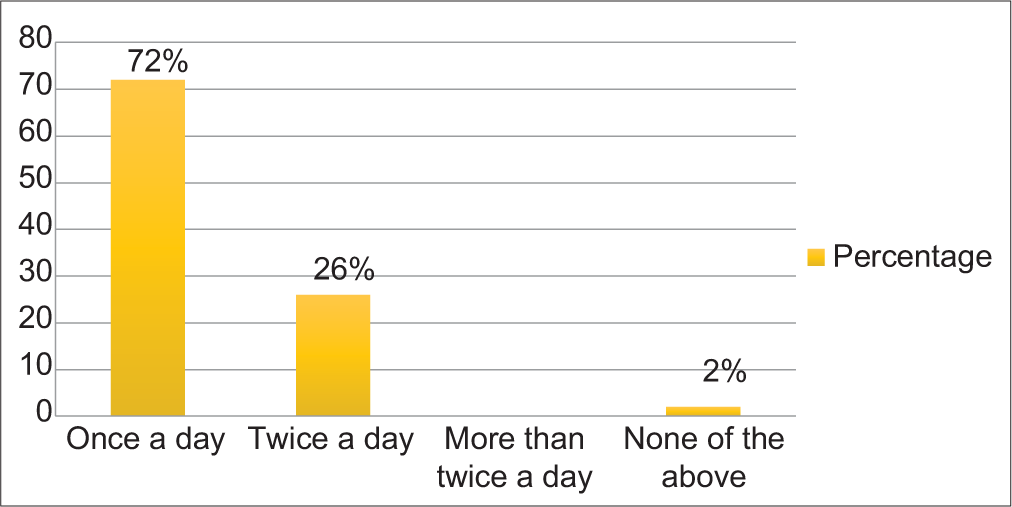
- Responses to number of times child brushing teeth.
Question 2: Your child will brush his/her teeth
This [Graph 2] shows that 76 mothers and 10 fathers are brushing their child’s teeth and 14 children are brushing their teeth by themselves, which interprets that the attitude of the parent’s toward their child’s oral hygiene is positive among mother when compared to father.
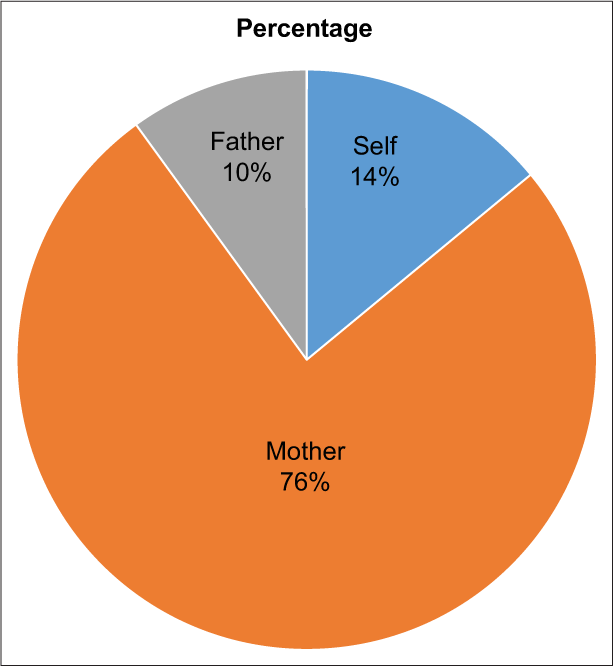
- Responses to who brushes child’s teeth.
Question 3: Do you brush your child’s teeth regularly?
This [Graph 3] shows that 69 parents are brushing their child’s teeth regularly and 31 parents are not, which highlights the negligence of child’s oral health by the parents is low.

- Responses to brushing regularity.
Question 4: Did you know how to brush your child’s teeth in a correct way?
This [Graph 4] shows 85 parents knew the proper brushing technique for their children and 15 parents do not knew it.

- Responses to brushing technique.
Question 5: What is the reason for brushing your child’s teeth daily?
This [Graph 5] shows 52 parents brush their child’s teeth daily due to fear of consequences of poor oral health, 44 parents do since they think it is best for their child’s oral health, and 4 parents do it as their daily duty or routine work.
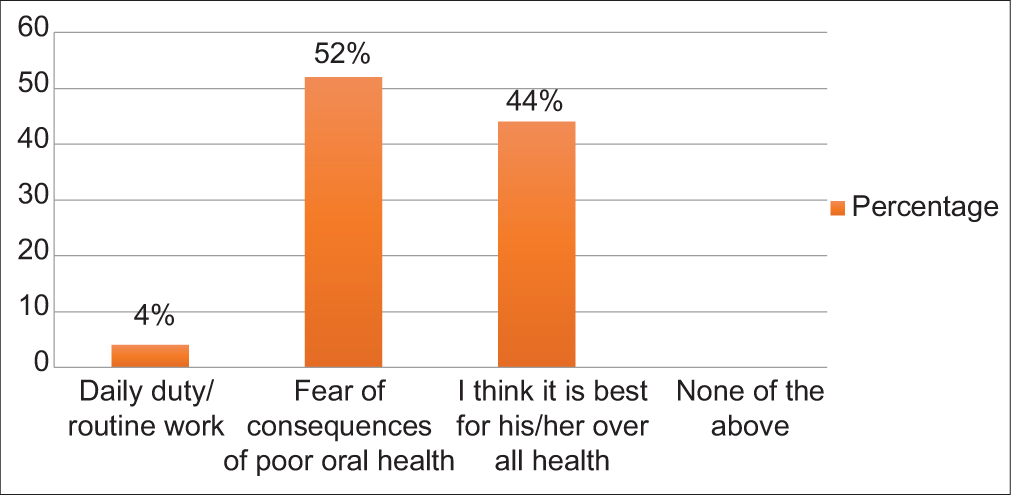
- Responses to reasons for brushing teeth.
Question 6: Difficulty in brushing your child’s teeth
This [Graph 6] shows that the reason for difficulty of parents in brushing their child’s teeth is, 43% due to child’s uncooperative behavior, 21% due to lack of time, 14% due to swallowing of toothpaste, 8% due to lack of family support, 4% due to child’s crowded teeth, and 10% due to no reason.
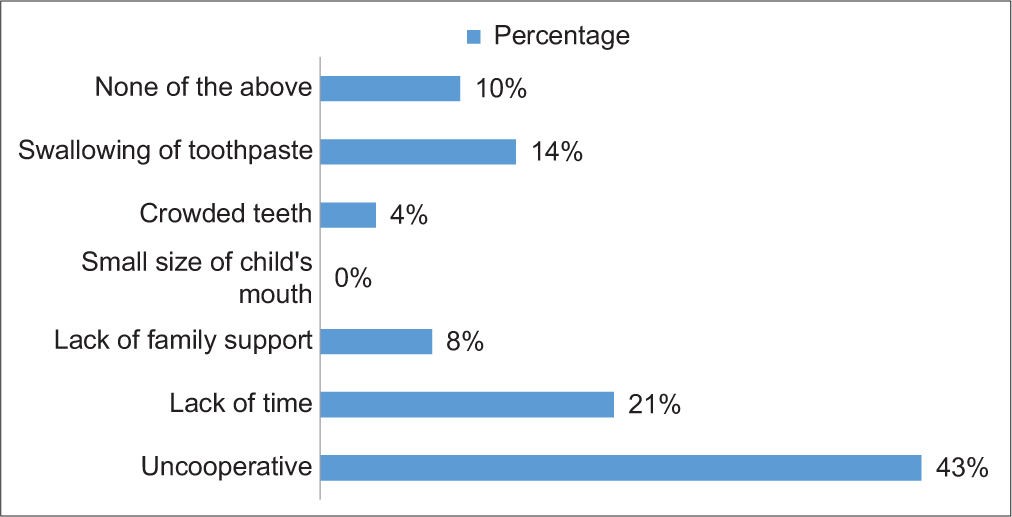
- Responses to difficulty in brushing.
Question 7: Why your child does not like brushing his/her teeth?
This [Graph 7] shows that 41 children did not like to brush their teeth due to unpleasant taste/flavor of toothpaste, 28 children due to forceful brushing by parents, 27 children did not like to brush their teeth as toothbrush is not attractive, and 4 children due to no reason, which clearly shows that the flavor and pleasant smell of toothpaste play a key role in making the children brush their teeth.

- Responses to child not liking to brush.
Question 8: Why your child skips brushing his/her teeth?
This [Graph 8] shows the reason for why child skips brushing his/her teeth, 36 children skip brushing due to child’s bad mood/unwillingness, 29 children are due to their distraction to other children, 22 children due to tiredness, 10 children due to loss of tooth brush, and 3 children due to no reason, which clearly shows that child brushing their teeth will be based upon their willingness/ mood.
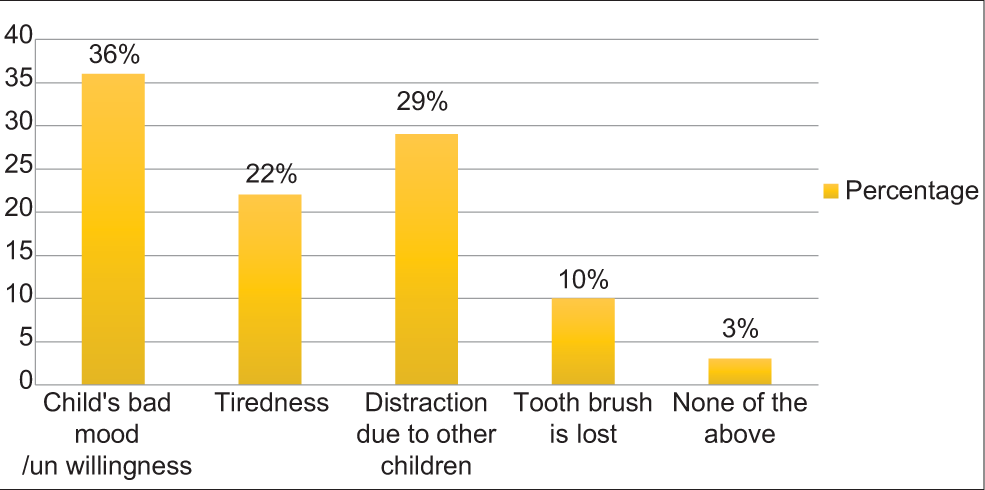
- Responses to reason for child skipping to brush.
Question 9: Child’s reason for not brushing his/her teeth twice daily
This [Graph 9] shows that 57 children did not brush their teeth twice daily due to sleepiness, 17 children due to laziness, 14 children due to lack of family brushing habit at night, 10 children due to their excuses like I brushed the teeth at morning itself, and 2 children due to no reason, which shows that children who sleeps early at night are not brushing their teeth twice daily.
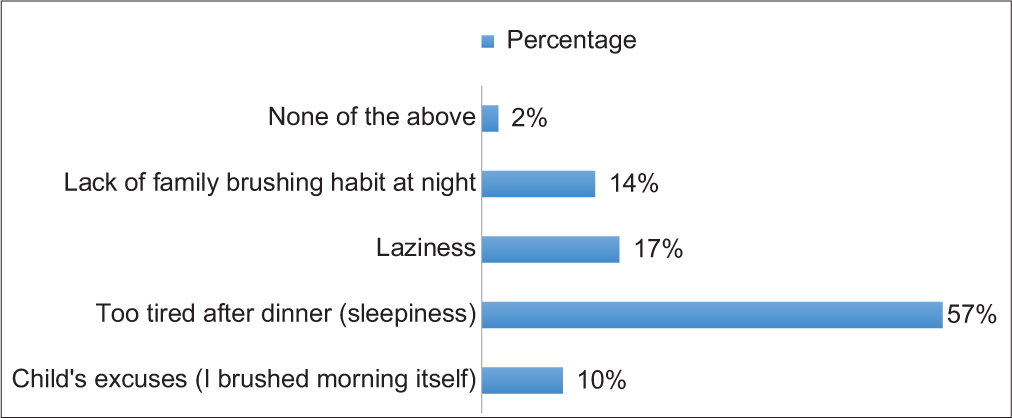
- Responses to child not brushing teeth.
Question 10: Will your child be willing to brush his/ her teeth while going outdoor (Function/vacation/ grandparent’s home)?
This [Graph 10] shows that 31 children will brush their teeth even though when they go outdoors for a vacation and 69 children will not.
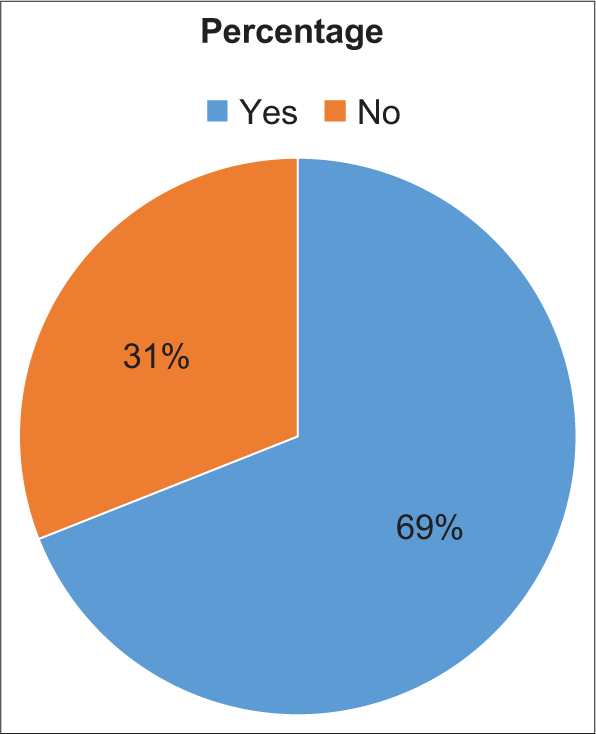
- Responses to child brushing on outdoors.
Question 11: Reason for allowing your child to skip brushing his/her teeth for a single day
This [Graph 11] shows that 51 parents will allow their child to skip brushing their teeth for a single day when their child is not well, 30 parents when their child resist, 7 parents when the toothbrush is lost, 6 parents due to no reason, 4 parents if they had work, and 2 parents when they are tired, hence, it reveals that parents get compromised on their child’s oral hygiene when the child is not well.

- Responses to allowing child to skip brushing.
Question 12: Is it even easier when both parents are there at home while child is brushing his/her teeth?
This [Graph 12] shows that 73 parents agree that it is easier when both of them were present at home while their child is brushing and 27 parents were not, which predicts that the presence of both the parents helps in making their child’s oral health better.
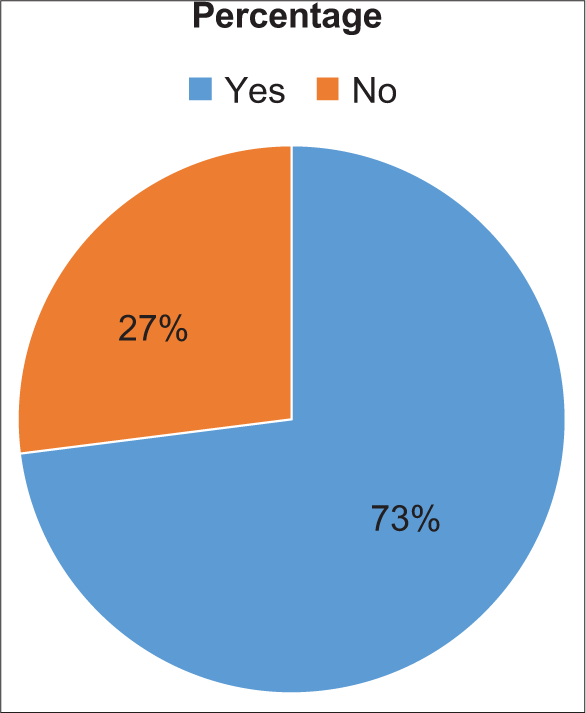
- Responses to ease of brushing with both parents.
DISCUSSION
This study examined the home oral hygiene practices of the children of age group between 2 and 8 years and to gain an in-depth understanding of the issues parents face in brushing their child’s teeth at home.
The current study found that 72 children are brushing their teeth once daily and 26 children are brushing twice daily and 2 children are not brushing their teeth, which reveals that the awareness and importance of good oral hygiene is less among the study population. Our result coincides with Heubner et al.[14] and Trubey et al.[19] study which shows that oral health promotion has been based on an assumption that parents who brush their children’s teeth infrequently do so because they have poor oral health knowledge or do not prioritize their child’s oral health.
In our present study, 76 mothers and 10 fathers are brushing their child’s teeth and 14 children are brushing their teeth by themselves, which interprets that the attitude of the parent’s toward their child’s oral hygiene is positive among mother when compared to father. Furthermore, 69 parents are brushing their child’s teeth regularly and 31 parents are not, which highlights the negligence of child’s oral health by the parents is low.
The current study found that the reason for parent’s difficulty in brushing their child’s teeth is, 43% due to child’s uncooperative behavior, 21% due to lack of time, 14% due to swallowing of toothpaste, 8% due to lack of family support, 4% due to child’s crowded teeth, and 10% due to no reason. This finding is concurrent with the results of Campanaro et al.[20] that external factors, specifically time pressures and the child’s compliance as the most common barriers to tooth brushing.
In our present study, 41 children did not like to brush their teeth due to unpleasant taste/flavor of toothpaste, 28 children due to forceful brushing by parents, 27 children did not like to brush their teeth as toothbrush is not attractive and 4 children due to no reason, which clearly shows that the flavor and pleasant smell of toothpaste play a key role in making the children brush their teeth which is similar to the results of Campanaro et al.[20] that the availability of a variety of tooth brushing supplies, such as toothpaste that tastes good to the child or a vibrating tooth brush, was significantly associated with brushing teeth twice a day.
In this present study, 51 parents will allow their child to skip brushing their teeth for a single day when their child is not well, 30 parents when their child resist, 7 parents when the toothbrush is lost, 6 parents due to no reason, 4 parents if they had work, and 2 parents when they are tired, hence, it reveals that parents get compromised on their child’s oral hygiene when the child is not well.
The current study shows that 73 parents agree, it is easier when both of them were present at home while their child is brushing and 27 parents were not, which predicts that the presence of both the parents helps in making their child’s oral health better. Our result coincides with Trubey et al.[19] study on the same research topic which shows that the other factors may actually be important in parental decision-making about home tooth brushing.
CONCLUSION
The present study revealed that the awareness and importance of good oral hygiene is less among the parents and the attitude of the parents toward their child’s oral hygiene is positive among mother when compared to father. In addition, other factors may actually be important in parental decision-making about home tooth brushing which includes the availability of a variety of tooth brushing supplies, such as toothpaste that tastes good to the child or a vibrating tooth brush, which was significantly associated with brushing the teeth twice a day.
Recommendation
Since the awareness and importance of good oral hygiene is less among the parents and the attitude of the parent’s toward their child’s oral hygiene is low, there is a need to educate the parents about the oral hygiene habits and the importance of twice brushing daily through the mass education awareness program and counseling in improving the oral health of the children. Incorporation of Oral Health Orientation Program in the school education curriculum could also bring changes in the oral health behavior and knowledge among the children.
Declaration of patient consent
The authors certify that they have obtained all appropriate patient consent.
Conflicts of interest
There are no conflicts of interest.
Financial support and sponsorship
Nil.
References
- The World Oral Health report 2003: Continuous improvement of oral health in the 21st century-the approach of the WHO global oral health programme. Community Dent Oral Epidemiol. 2003;31:3-23.
- [CrossRef] [PubMed] [Google Scholar]
- Oral health care for children with developmental disabilities. Paediatrics. 2013;131:614.
- [CrossRef] [PubMed] [Google Scholar]
- The dental caries experience of 5-year-old children in Great Britain (2005/6). Surveys co-ordinated by the British association for the study of community dentistry. Community Dent Health. 2007;24:59-63.
- [Google Scholar]
- Predicting caries in permanent teeth from caries in primary teeth: An eight-year cohort study. J Dent Res. 2002;81:561-6.
- [CrossRef] [PubMed] [Google Scholar]
- Dental caries is a preventable infectious disease. Aust Dent J. 2000;45:235-45.
- [CrossRef] [PubMed] [Google Scholar]
- Dental Care Every Day: A Caregiver's Guide. 2012. Available from: http://www.nidcr.nih.gov/oralhealth/topics/developmentaldisabilities/dentalcareeveryday.htm [Last accessed on 2013 Jan 29]
- [Google Scholar]
- The influence of toothbrushing frequency and post-brushing rinsing on caries experience in a caries clinical trial. Community Dent Oral Epidemiol. 1998;26:406-11.
- [CrossRef] [PubMed] [Google Scholar]
- Nutritional role of sugars in oral health. Am J Clin Nutr. 1995;62:275S-83S.
- [CrossRef] [PubMed] [Google Scholar]
- Should we brush twice a day? Determinants of dental health among young adults in Finland. Health Econ. 2008;17:267-86.
- [CrossRef] [PubMed] [Google Scholar]
- Toothbrushes. 2012. Available from: http://www.ada.org/1321.aspx [Last accessed on 2012 Oct 25]
- [Google Scholar]
- Fast Facts: Preventive Step 1-Good Home Care. 2012. Available from: http://www.aapd.org/assets/1/7/fastfacts.pdf [Last accessed on 2013 Feb 11]
- [Google Scholar]
- A Paediatric Guide to Children's Oral Health. 2010. Available from: http://www.2.aap.org/oralhealth/docs/oralhealthfcpagesf2_2_1.pdf [Last accessed on 2013 Jan 29]
- [Google Scholar]
- Familial and cultural perceptions and beliefs of oral hygiene and dietary practices among ethnically and socio-economicall diverse groups. Community Dental Health. 2004;21:102-11.
- [Google Scholar]
- Behavioral determinants of brushing young children's teeth: Implications for anticipatory guidance. Pediatr Dent. 2010;32:48-55.
- [Google Scholar]
- Parental influence and the development of dental caries in children aged 0-6 Years: A systematic review of the literature. J Dent. 2012;40:873-85.
- [CrossRef] [PubMed] [Google Scholar]
- Oral health literacy among female caregivers: Impact on oral health outcomes in early childhood. J Dent Res. 2010;89:1395-400.
- [CrossRef] [PubMed] [Google Scholar]
- Determinants of oral hygiene behavior: A study based on the theory of planned behavior. Community Dent Oral Epidemiol. 2011;39:250-9.
- [CrossRef] [PubMed] [Google Scholar]
- Developing explanatory models of health inequalities in childhood dental caries. Community Dent Health. 2004;21(Suppl 1):86-95.
- [Google Scholar]
- Parents' reasons for brushing or not brushing their child's teeth: A qualitative study. Int J Paediatr Dent. 2014;24:104-12.
- [CrossRef] [PubMed] [Google Scholar]
- Facilitators and barriers to twice daily tooth brushing among children with special health care needs. Spec Care Dentist. 2014;34:185-92.
- [CrossRef] [PubMed] [Google Scholar]






